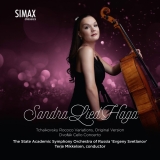 Piotr Tchaikovsky: Rokoko-Variationen (Originalversion); Antonin Dvorak: Cellokonzert op. 104: Sandra Lied Haga, Cello, Russian State Symphony Orchestra Evgeny Svetlanov, Terje Mikkelsen; 1 CD Simax PSC 1363; Aufnahme 02/2019, Veröffentlichung 08/05/2020 (61'67 - Rezension von Remy Franck
Piotr Tchaikovsky: Rokoko-Variationen (Originalversion); Antonin Dvorak: Cellokonzert op. 104: Sandra Lied Haga, Cello, Russian State Symphony Orchestra Evgeny Svetlanov, Terje Mikkelsen; 1 CD Simax PSC 1363; Aufnahme 02/2019, Veröffentlichung 08/05/2020 (61'67 - Rezension von Remy Franck
Auf ihrer Debüt-CD stellt sich die 1994 in Oslo geborene Sandra Lied Haga mit zwei Schwergewichten der Cello-Literatur vor. Ein Risiko war das für sie nicht, nach allem was man in den beiden Werken zu hören bekommt. Besonders charakteristisch ist wohl ihr voller, satter und ungewöhnlich reicher Celloklang. Lupenfreine Intonation, eine klare und sichere Phrasierung sowie eine hinreißende Kantabilität zeichnen ihr Spiel aus, das zu berückendsten Pianissimi und einer ebenfalls tollen Virtuosität fähig ist.
Das Cellokonzert von Dvorak spielt sie wunderbar sensibel, mit herrlichen Klangfarben, hinreißend lyrisch und immer wieder auch mit hochvirtuosem Elan. Nicht nur im langsamen Satz kann sie sich wirklich stark in die Musik vertiefen, denn ihr Spiel erreicht das ganze Konzert über eine phänomenale Eloquenz.
Auch in der Originalfassung von Tschaikowskys Rokokovariationen ist der schöne und intensive Klang ihres Cellos (ein Guidantus von 1730 aus Bologna) absolut hinreißend. Sie spielt mit einem sicheren Gespür für die Musik, faszinierendem Raffinement, stilvoll, charmant und in den langsamen Teilen bewegend gefühlvoll.
Leider hat sie mit dem Svetlanov-Orchester nicht den passenden Partner. Das Spiel der Russen klingt manchmal schlampig und es fehlt ihm generell an Flexibilität, Geschmeidigkeit und Klangqualität. Letztlich wirkt das wie ein Edelstein auf einem Haufen Bauschutt. Das kostet die CD Punkte, obwohl das Spiel der Cellistin eigentlich höchstbewertet hätte werden müssen.
On her debut CD, the 26-year-old Norwegian Sandra Lied Haga presents herself with two heavyweights of the cello literature. It was not a risk for her, after all what you can hear in the two works. Especially characteristic is her full and unusually rich cello sound. Flawless intonation, a clear and secure phrasing as well as a ravishing cantabile distinguish her playing, which is capable of the most enchanting pianissimos and an equally great virtuosity.Her account of Dvorak’s Cello Concerto is very sensitive and colourful, enchantingly lyrical and from time to time it also shows one highly virtuosic verve. Not only in the slow movement can she really immerse herself in the music, because her playing achieves a phenomenal eloquence throughout the entire concerto.Even in the original version of Tchaikovsky’s Rococo Variations, the beautiful and intense sound of her cello (a Guidantus from 1730 from Bologna) is absolutely enchanting. She plays with a sure feeling for the music, fascinating refinement, stylish, charming and in the slow parts movingly soulful.Unfortunately with the Svetlanov Orchestra she does not have the right partner. The playing of the Russians sometimes sounds sloppy and generally lacks flexibility, suppleness and sound quality. In the end, it looks like a gem on a pile of rubble. This diminishes our rating, even though the cellist’s playing deserves the highest praise.






















